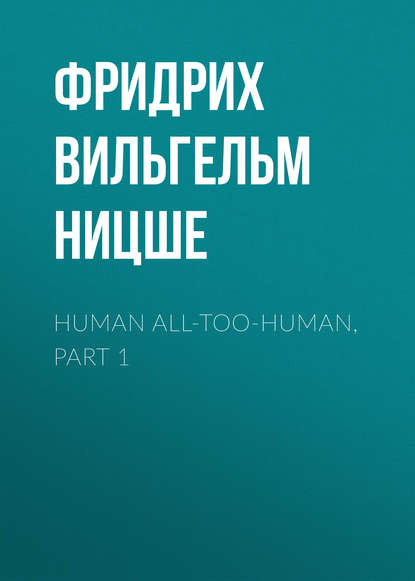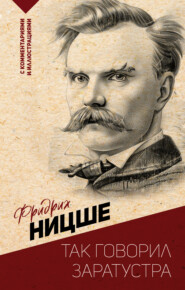По всем вопросам обращайтесь на: info@litportal.ru
(©) 2003-2025.
✖
Human All-Too-Human, Part 1
Настройки чтения
Размер шрифта
Высота строк
Поля
81
Errors of the Sufferer and the Doer. – When a rich man deprives a poor man of a possession (for instance, a prince taking the sweetheart of a plebeian), an error arises in the mind of the poor man; he thinks that the rich man must be utterly infamous to take away from him the little that he has. But the rich man does not estimate so highly the value of a single possession, because he is accustomed to have many; hence he cannot imagine himself in the poor man's place, and does not commit nearly so great a wrong as the latter supposes. They each have a mistaken idea of the other. The injustice of the powerful, which, more than anything else, rouses indignation in history, is by no means so great as it appears. Alone the mere inherited consciousness of being a higher creation, with higher claims, produces a cold temperament, and leaves the conscience quiet; we all of us feel no injustice when the difference is very great between ourselves and another creature, and kill a fly, for instance, without any pricks of conscience. Therefore it was no sign of badness in Xerxes (whom even all Greeks describe as superlatively noble) when he took a son away from his father and had him cut in pieces, because he had expressed a nervous, ominous distrust of the whole campaign; in this case the individual is put out of the way like an unpleasant insect; he is too lowly to be allowed any longer to cause annoyance to a ruler of the world. Yes, every cruel man is not so cruel as the ill-treated one imagines the idea of pain is not the same as its endurance. It is the same thing in the case of unjust judges, of the journalist who leads public opinion astray by small dishonesties. In all these cases cause and effect are surrounded by entirely different groups of feelings and thoughts; yet one unconsciously takes it for granted that doer and sufferer think and feel alike, and according to this supposition we measure the guilt of the one by the pain of the other.
82
The Skin of the Soul. – As the bones, flesh, entrails, and blood-vessels are enclosed within a skin, which makes the aspect of man endurable, so the emotions and passions of the soul are enwrapped with vanity, – it is the skin of the soul.
83
The Sleep of Virtue. – When virtue has slept, it will arise again all the fresher.
84
The Refinement of Shame. – People are not ashamed to think something foul, but they are ashamed when they think these foul thoughts are attributed to them.
85
Malice Is Rare. – Most people are far too much occupied with themselves to be malicious.
86
The Tongue in the Balance. – We praise or blame according as the one or the other affords more opportunity for exhibiting our power of judgment.
87
St. Luke Xviii. 14, Improved. – He that humbleth himself wishes to be exalted.
88
The Prevention of Suicide. – There is a certain right by which we may deprive a man of life, but none by which we may deprive him of death; this is mere cruelty.
89
Vanity. – We care for the good opinion of men, firstly because they are useful to us, and then because we wish to please them (children their parents, pupils their teachers, and well-meaning people generally their fellow-men). Only where the good opinion of men is of importance to some one, apart from the advantage thereof or his wish to please, can we speak of vanity. In this case the man wishes to please himself, but at the expense of his fellow-men, either by misleading them into holding a false opinion about him, or by aiming at a degree of "good opinion" which must be painful to every one else (by arousing envy). The individual usually wishes to corroborate the opinion he holds of himself by the opinion of others, and to strengthen it in his own eyes; but the strong habit of authority – a habit as old as man himself – induces many to support by authority their belief in themselves: that is to say, they accept it first from others; they trust the judgment of others more than their own. The interest in himself, the wish to please himself, attains to such a height in a vain man that he misleads others into having a false, all too elevated estimation of him, and yet nevertheless sets store by their authority, – thus causing an error and yet believing in it. It must be confessed, therefore, that vain people do not wish to please others so much as themselves, and that they go so far therein as to neglect their advantage, for they often endeavour to prejudice their fellow-men unfavourably, inimicably, enviously, consequently injuriously against themselves, merely in order to have pleasure in themselves, personal pleasure.
90
The Limits of Human Love. – A man who has declared that another is an idiot and a bad companion, is angry when the latter eventually proves himself to be otherwise.
91
Moralité Larmoyante.– What a great deal of pleasure morality gives! Only think what a sea of pleasant tears has been shed over descriptions of noble and unselfish deeds! This charm of life would vanish if the belief in absolute irresponsibility were to obtain supremacy.
92
The Origin of Justice. – Justice (equity) has, its origin amongst powers which are fairly equal, as Thucydides (in the terrible dialogue between the Athenian and Melian ambassadors) rightly comprehended: that is to say, where there is no clearly recognisable supremacy, and where a conflict would be useless and would injure both sides, there arises the thought of coming to an understanding and settling the opposing claims; the character of exchange is the primary character of justice. Each party satisfies the other, as each obtains what he values more than the other. Each one receives that which he desires, as his own henceforth, and whatever is desired is received in return. Justice, therefore, is recompense and exchange based on the hypothesis of a fairly equal degree of power, – thus, originally, revenge belongs to the province of justice, it is an exchange. Also gratitude. – Justice naturally is based on the point of view of a judicious self-preservation, on the egoism, therefore, of that reflection, "Why should I injure myself uselessly and perhaps not attain my aim after all?" So much about the origin of justice. Because man, according to his intellectual custom, has forgotten the original purpose of so-called just and reasonable actions, and particularly because for hundreds of years children have been taught to admire and imitate such actions, the idea has gradually arisen that such an action is un-egoistic; upon this idea, however, is based the high estimation in which it is held: which, moreover, like all valuations, is constantly growing, for something that is valued highly is striven after, imitated, multiplied, and increases, because the value of the output of toil and enthusiasm of each individual is added to the value of the thing itself. How little moral would the world look without this forgetfulness! A poet might say that God had placed forgetfulness as door-keeper in the temple of human dignity.
Errors of the Sufferer and the Doer. – When a rich man deprives a poor man of a possession (for instance, a prince taking the sweetheart of a plebeian), an error arises in the mind of the poor man; he thinks that the rich man must be utterly infamous to take away from him the little that he has. But the rich man does not estimate so highly the value of a single possession, because he is accustomed to have many; hence he cannot imagine himself in the poor man's place, and does not commit nearly so great a wrong as the latter supposes. They each have a mistaken idea of the other. The injustice of the powerful, which, more than anything else, rouses indignation in history, is by no means so great as it appears. Alone the mere inherited consciousness of being a higher creation, with higher claims, produces a cold temperament, and leaves the conscience quiet; we all of us feel no injustice when the difference is very great between ourselves and another creature, and kill a fly, for instance, without any pricks of conscience. Therefore it was no sign of badness in Xerxes (whom even all Greeks describe as superlatively noble) when he took a son away from his father and had him cut in pieces, because he had expressed a nervous, ominous distrust of the whole campaign; in this case the individual is put out of the way like an unpleasant insect; he is too lowly to be allowed any longer to cause annoyance to a ruler of the world. Yes, every cruel man is not so cruel as the ill-treated one imagines the idea of pain is not the same as its endurance. It is the same thing in the case of unjust judges, of the journalist who leads public opinion astray by small dishonesties. In all these cases cause and effect are surrounded by entirely different groups of feelings and thoughts; yet one unconsciously takes it for granted that doer and sufferer think and feel alike, and according to this supposition we measure the guilt of the one by the pain of the other.
82
The Skin of the Soul. – As the bones, flesh, entrails, and blood-vessels are enclosed within a skin, which makes the aspect of man endurable, so the emotions and passions of the soul are enwrapped with vanity, – it is the skin of the soul.
83
The Sleep of Virtue. – When virtue has slept, it will arise again all the fresher.
84
The Refinement of Shame. – People are not ashamed to think something foul, but they are ashamed when they think these foul thoughts are attributed to them.
85
Malice Is Rare. – Most people are far too much occupied with themselves to be malicious.
86
The Tongue in the Balance. – We praise or blame according as the one or the other affords more opportunity for exhibiting our power of judgment.
87
St. Luke Xviii. 14, Improved. – He that humbleth himself wishes to be exalted.
88
The Prevention of Suicide. – There is a certain right by which we may deprive a man of life, but none by which we may deprive him of death; this is mere cruelty.
89
Vanity. – We care for the good opinion of men, firstly because they are useful to us, and then because we wish to please them (children their parents, pupils their teachers, and well-meaning people generally their fellow-men). Only where the good opinion of men is of importance to some one, apart from the advantage thereof or his wish to please, can we speak of vanity. In this case the man wishes to please himself, but at the expense of his fellow-men, either by misleading them into holding a false opinion about him, or by aiming at a degree of "good opinion" which must be painful to every one else (by arousing envy). The individual usually wishes to corroborate the opinion he holds of himself by the opinion of others, and to strengthen it in his own eyes; but the strong habit of authority – a habit as old as man himself – induces many to support by authority their belief in themselves: that is to say, they accept it first from others; they trust the judgment of others more than their own. The interest in himself, the wish to please himself, attains to such a height in a vain man that he misleads others into having a false, all too elevated estimation of him, and yet nevertheless sets store by their authority, – thus causing an error and yet believing in it. It must be confessed, therefore, that vain people do not wish to please others so much as themselves, and that they go so far therein as to neglect their advantage, for they often endeavour to prejudice their fellow-men unfavourably, inimicably, enviously, consequently injuriously against themselves, merely in order to have pleasure in themselves, personal pleasure.
90
The Limits of Human Love. – A man who has declared that another is an idiot and a bad companion, is angry when the latter eventually proves himself to be otherwise.
91
Moralité Larmoyante.– What a great deal of pleasure morality gives! Only think what a sea of pleasant tears has been shed over descriptions of noble and unselfish deeds! This charm of life would vanish if the belief in absolute irresponsibility were to obtain supremacy.
92
The Origin of Justice. – Justice (equity) has, its origin amongst powers which are fairly equal, as Thucydides (in the terrible dialogue between the Athenian and Melian ambassadors) rightly comprehended: that is to say, where there is no clearly recognisable supremacy, and where a conflict would be useless and would injure both sides, there arises the thought of coming to an understanding and settling the opposing claims; the character of exchange is the primary character of justice. Each party satisfies the other, as each obtains what he values more than the other. Each one receives that which he desires, as his own henceforth, and whatever is desired is received in return. Justice, therefore, is recompense and exchange based on the hypothesis of a fairly equal degree of power, – thus, originally, revenge belongs to the province of justice, it is an exchange. Also gratitude. – Justice naturally is based on the point of view of a judicious self-preservation, on the egoism, therefore, of that reflection, "Why should I injure myself uselessly and perhaps not attain my aim after all?" So much about the origin of justice. Because man, according to his intellectual custom, has forgotten the original purpose of so-called just and reasonable actions, and particularly because for hundreds of years children have been taught to admire and imitate such actions, the idea has gradually arisen that such an action is un-egoistic; upon this idea, however, is based the high estimation in which it is held: which, moreover, like all valuations, is constantly growing, for something that is valued highly is striven after, imitated, multiplied, and increases, because the value of the output of toil and enthusiasm of each individual is added to the value of the thing itself. How little moral would the world look without this forgetfulness! A poet might say that God had placed forgetfulness as door-keeper in the temple of human dignity.

















